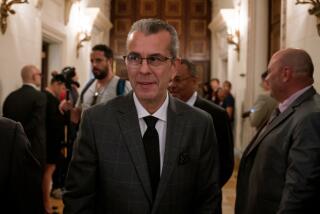But What Do Cubans Really Think?
- Share via
HAVANA — A handwritten letter from Cuban President Fidel Castro published in the daily newspaper Granma urged compatriots to vote the government slate for Parliament “to show the enemy our strength and unity when he wants to divide us, weaken us, demoralize us.”
Although Castro and the Cuban nomenklatura were submitting to a direct, popular vote for the first time in their 34 years of rule, the Feb. 24 election was launched as a battle against the U.S. imperialist enemy rather than as a referendum on their Communist government.
To no one’s surprise, the government won a resounding electoral victory, claiming a nearly 99% turnout and a 95% yes vote.
But what did the election say about the way Cubans feel toward their leaders? That was not so clear.
Many voters genuinely seemed to support the government. Despite the prolonged economic crisis, they felt a stake in the revolution and shared Castro’s anger at the U.S. government for its trade embargo.
“People who complain about the crisis are not revolutionaries,” said Marta Luque, 38, a secretary in central Havana. “We have very little here, but what we have is shared. No one has died of hunger.”
Sergio Mora Diaz, a 66-year-old bus driver, nodded. “This is still better than Cuba before the revolution, when I slept in doorways as a child,” he said.
Others, however, said they had voted for the government out of fear. The balloting was secret, yet several people said they felt party block leaders would trace negative votes to them because their discontent was well-known.
“I am trying to leave here,” said an engineer who has applied for a Spanish passport as the son of a Spanish citizen. “My son has already left, and so I am not ideologically trustworthy. So I voted yes and made sure everyone saw the ballot as I put it in the box.”
More to Read
Sign up for Essential California
The most important California stories and recommendations in your inbox every morning.
You may occasionally receive promotional content from the Los Angeles Times.













